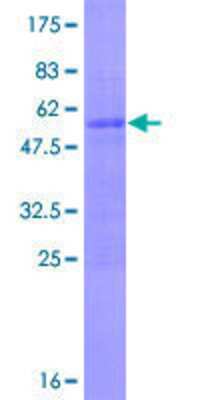Musculin: Proteins and Enzymes
Differentiation of myogenic cells is regulated by multiple positively and negatively acting factors. One well characterized family of helix-loop-helix (HLH) proteins, known to play an important role in the regulation of muscle cell development, includes MyoD, myogenin and musculin (also designated MyoR). Members of this group of transcription factors form heterodimers with products of a more widely expressed family of bHLH genes, the E family, which consists of at least three distinct genes: E2A, IF2 and HEB. MyoD-E or musculin-E heterodimers bind avidly to consensus E box motifs, which are functionally important elements in the promoter regions of many musclespecific terminal differentiation genes. MyoD complexes potently induce transcriptional activation, while musculin complexes bind adjacent to MyoD DNA-binding regions to represses MyoD activity, which then results in the delayed expression of muscle-specific genes. Musculin is highly expressed in undifferentiated and proliferating myoblasts in culture, and its expression is down regulated during myogenesis and at the onset of terminal differentiation
Show More
3 results for "Musculin Proteins and Enzymes" in Products
3 results for "Musculin Proteins and Enzymes" in Products
Musculin: Proteins and Enzymes
Differentiation of myogenic cells is regulated by multiple positively and negatively acting factors. One well characterized family of helix-loop-helix (HLH) proteins, known to play an important role in the regulation of muscle cell development, includes MyoD, myogenin and musculin (also designated MyoR). Members of this group of transcription factors form heterodimers with products of a more widely expressed family of bHLH genes, the E family, which consists of at least three distinct genes: E2A, IF2 and HEB. MyoD-E or musculin-E heterodimers bind avidly to consensus E box motifs, which are functionally important elements in the promoter regions of many musclespecific terminal differentiation genes. MyoD complexes potently induce transcriptional activation, while musculin complexes bind adjacent to MyoD DNA-binding regions to represses MyoD activity, which then results in the delayed expression of muscle-specific genes. Musculin is highly expressed in undifferentiated and proliferating myoblasts in culture, and its expression is down regulated during myogenesis and at the onset of terminal differentiation
Show More
| Applications: | WB, ELISA, MA, AP |
| Applications: | WB, ELISA, MA, AP |
| Applications: | WB, ELISA, MA, AP |

